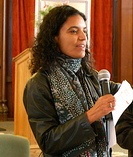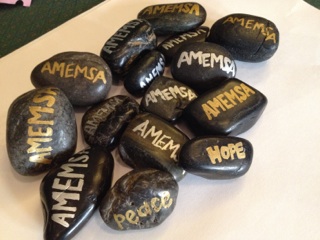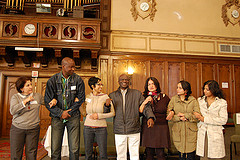The Civic Engagement Fund builds community and organizational connections.
Reflections on CEF’s final convening and what this moment marks from 3 participants: Laila Mehta, Raeshma Rizvi, Sabiha Basrai.
Laila Mehta (AAPIP)
 Last fall the Civic Engagement Fund held its ninth and final convening under Phase 2 of the Fund. It was a bittersweet day for many of us who looked forward to attending these convenings three times a year for the past three years. They are often filled with the excitement of coming together to share stories, struggles and strategies. Yet this convening marked the final time that staff, directors and volunteers from sixteen Arab, Middle Eastern, Muslim and South Asian (AMEMSA) community organizations would gather in this particular way.
Last fall the Civic Engagement Fund held its ninth and final convening under Phase 2 of the Fund. It was a bittersweet day for many of us who looked forward to attending these convenings three times a year for the past three years. They are often filled with the excitement of coming together to share stories, struggles and strategies. Yet this convening marked the final time that staff, directors and volunteers from sixteen Arab, Middle Eastern, Muslim and South Asian (AMEMSA) community organizations would gather in this particular way.
After three years of planning activities and advocacy around the themes of immigrant and refugee rights, political participation, and civil rights, we wanted to both celebrate what we accomplished and be visionary for the future. In the main exercise of the day, the groups imagined how AMEMSA community civic engagement would evolve locally and nationally, by the year 2020.
For more photos, visit us on Flickr.
For a closer look, two CEF grantee representatives share with us their perspectives about our convenings, the program overall, and what it means to find both personal and organizational space to grow.
Raeshma Rizvi
Director, Art & Culture program, Islamic Cultural and Community Center of Northern CA
 Working for the Islamic Cultural Center of Northern California, I was particularly pleased that it was through our doors that AMEMSA members would find their way for the final cohort convening in October 2013. One of the reasons I work with this organization is to creatively facilitate and broaden ideas of what ‘Islamic culture’ is, can be, or should do.
Working for the Islamic Cultural Center of Northern California, I was particularly pleased that it was through our doors that AMEMSA members would find their way for the final cohort convening in October 2013. One of the reasons I work with this organization is to creatively facilitate and broaden ideas of what ‘Islamic culture’ is, can be, or should do.
There are some chilly, heavy issues that underpin our work — things like Islamophobia, intolerance, and immigration backlash. These weigh onto the already difficult challenges of growing new organizations and programs, and serving diverse, often fragmented communities.
The deep knowledge that you are not alone helps alleviate this greater chill. Being part of the AMEMSA cohort has provided that in spades. Living in the Bay Area is wonderful for many reasons, but I have also experienced it as a fragmented place socially and culturally. These convenings have great meaning for me by drawing in a group from across many lines, and inspiring me to rethink those lines and my new Bay Area home. Being part of CEF is one of the best cohort experiences, and has motivated me to engage more at both professional and personal levels.
As I write this, two little rocks with words written on them peek out from a gauzy pouch on my desk. As a parting group activity, AAPIP folks gathered us in a circle and we each drew out a small stone with a word inked onto it, and reflected out loud about our words. Mine was ‘power’ and I keep it always paired with the larger rock that says ‘AMEMSA.’ It reminds me that ‘power’ never stands alone; relationships are power, and through them we generate the heat that warms our efforts and our hearts.
Sabiha Basrai (ASATA)
Co-Coordinator, Alliance of South Asians Taking Action
 ASATA’s participation in the Civic Engagement Fund renewed our connections with Arab Resource and Organizing Center, Narika, and Third i, while also building new relationships with African Advocacy Network, Omid Advocates, Council on American Islamic Relations, and several other awesome organizations. Meeting regularly with the organizations in our Immigrant and Refugee Rights Learning Circle allowed ASATA to deepen our understanding of how immigration policies affect AMEMSA communities and think more about our role as activists on those issues. We had a historical context for our conversations and looked at policies like the Chinese Exclusion Act of 1882, Japanese American Internment during WWII, and other racially motivated anti-immigration laws.
ASATA’s participation in the Civic Engagement Fund renewed our connections with Arab Resource and Organizing Center, Narika, and Third i, while also building new relationships with African Advocacy Network, Omid Advocates, Council on American Islamic Relations, and several other awesome organizations. Meeting regularly with the organizations in our Immigrant and Refugee Rights Learning Circle allowed ASATA to deepen our understanding of how immigration policies affect AMEMSA communities and think more about our role as activists on those issues. We had a historical context for our conversations and looked at policies like the Chinese Exclusion Act of 1882, Japanese American Internment during WWII, and other racially motivated anti-immigration laws.
We also discussed current challenges that members of our diverse communities face such as no fly lists, deportation, and un-ending background checks for asylum seekers. These discussions allowed us to see how our different communities were similarly targeted in this post-9/11 climate of Islamophobia.
It has been especially interesting to learn about how AAPIP built support for this Civic Engagement Fund. Meeting the funders and explaining to them what we do was good practice in strategic story telling and building confidence in our work.
Though the cohort convenings are over, ASATA is still connected to all the groups that we met through the CEF and look forward to marching under the AMEMSA banner again on May Day.


